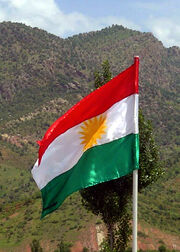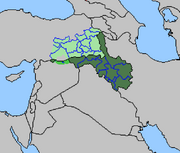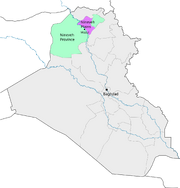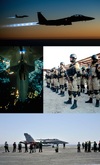This page is for the current sovereign state in the former Iraqi Kurdistan. For the for the former breakaway state in Iran, see Republic of Mahabad; for the greater region, see Kurdistan.
| Republic of Kurdistan Kurmanji Timeline: Scotland says "Yes"
OTL equivalent: Iraqi Kurdistan | |||||
|---|---|---|---|---|---|
|
|||||
| Anthem: Ey Reqîb |
|||||
| Map of Kurdistan (green), occupied areas (lighter green) and claimed areas (lightest green)
|
|||||
| Capital | Erbil | ||||
| Official languages | Kurdish | ||||
| Demonym | Kurdish | ||||
| Government | Presidential federal republic | ||||
| - | President | Masoud Barzani | |||
| - | Minister of Peshmerga Affairs | Mustafa Qadir Mustafa Aziz | |||
| Legislature | Kurdistan Parliament | ||||
| Establishment | |||||
| - | Iraqi Autonomy (De Jure) | 1970 | |||
| - | Erbil Conference | 17th December 2015 | |||
| - | Declaration of Independence | 21th December 2015 | |||
| Area | |||||
| - | Total | 78,736 km2 30,400 sq mi |
|||
| Population | |||||
| - | 2014 estimate | 5.5 million | |||
| Drives on the | Right | ||||
The Republic of Kurdistan, commonly known as Kurdistan ("Land of the Kurds") is a sovereign nation located in the Middle East, around the geographic area of the Zagros and Tauras Mountains. Its main two allies are Russia (which provides arms and training) and Scotland (which provides economic support (e.g. food), the latter of which is considering sending over humanitarian and medical workers.
The Kurds are an ethnicity that lives in the Middle East, previously in the countries of Iraq, Syria, Iran and Turkey, before the nation (excluding Iran) gained independence.
History
The Kurds are first mentioned in the 7th century A.D. and have lived in these areas for over 1300 years. Since World War I with the fall of the Ottoman Empire a desire for independence and their own Kurdish state arose but was denied at the time and until 2013 there was heavy guerrilla fighting by the Kurds to gain independence.
It is only recently with the dramatic rise of ISIS that the Kurds have gained both notoriety and a degree of autonomy. They suddenly found their areas in much of Iraq and Syria unoccupied by government troops and facing a dangerous enemy alone, and so they fought hard against them stopping much of their significant advances.

Kurdish Flag flying in Dohuk
On June 15th 2015 Alexander Salmond, the current First Minister of Scotland and the man said to be most likely to be Prime Minister of it, declared that he would recognize Kurdistan if elected as he sympathized with their struggle. This brought the issue of Kurdistan to the forefront of world politics and gave Alexander Salmond very easy solution to Syria as an issue. Many other politicians around the world in an attempt to provide an easy solution to ISIS agreed although no country recognized them.
On 24 November the Turks shot down a Russian jet for violating their airspace. Putin was irate and angry at the actions of Turkey and determined to bite back, but was offered a solution by a member of his cabinet, who had seen American politicians talking about Kurdistan. They gave Putin the suggestion to back Kurdistan as a country.
On 21 December, after four days of negotiation, Putin came out of a meeting with the Syrian, Iraqi, Iranian and Kurdish leaders as they all jointly declared Kurdistan a state. Several oil and mining companies then made deals with the Peshmerga which gave them enough money to take out loans from Russian banks to buy weapons to fight with.

Peshmerga T-72s heading towards Mosul
The cause of Kurdistan came to light very much when the Peshmerga on the 8th March 2016 using Russian equipment, such as T-72s and 2A65-Msta-Bs, launched a major assault and retook Tal Afar from ISIL. By the 9th they had secured offensive positions around the city, and on the 10th they besieged the city. On the 14th, Major gains were made by the Peshmerga, pushing ISIL forces to the centre of the city.
Military
Main Article: Peshmerga
The Peshmerga are the Armed Forces of the Republic of Kurdistan. Peshmerga means "one who confronts death" or "one who faces death". The Peshmerga have had a large role in wars since the First World War, especially now against "ISIL", or Da'esh.
Economy
Kurdistan's economy is currently dominated by the oil industry, agriculture and tourism, especially due to its more peaceful nature compared to the rest of Iraq. However, more recently, due to the war with ISIL and tensions growing, fewer tourists have been visiting.
Due to the stability of the region, many people have been attracted from parts of Iraq, and it has extremely low poverty rates.
However, due to campaigns by Saddam Hussein's government, Kurdistan has had little time to modernize its infrastructure, and therefore is often less developed than the countries it used to be part of. Despite this, with aid from other nations and the prediction of a returning tourist trade, the economy is predicted to start to grow, allowing modernization.
Administrative Regions

Kurdish Provinces. Light Green are Military Districts, Lightest Green is Claimed. White internal borders are former national borders, which also constitute provinces.
The Republic of Kurdistan is divided into four governates (Duhok, Erbil, Sulaymaniya and Halabja)
Proposed Assyrian Autonomy

The Nineveh plains within Nineveh province
Throughout Iraq's history there had been proposals for the establishment of an autonomous or independent state for the Syriac-speaking Assyrians. Many Kurdish politicians had publicly come out in support of annexing the area to the KRG as their fourth governorate, but this proved controversial, as many Assyrians saw this as a way to expand Kurdish power and influence.
With the Erbil Conference, many Assyrian areas were annexed. With discussions of re-organising the provinces, it has been proposed that the Nineveh plains area of the northern Nineveh province be given autonomy.
| ||||||||||||||||||||||||||||||
| ||||||||||||||||||||




